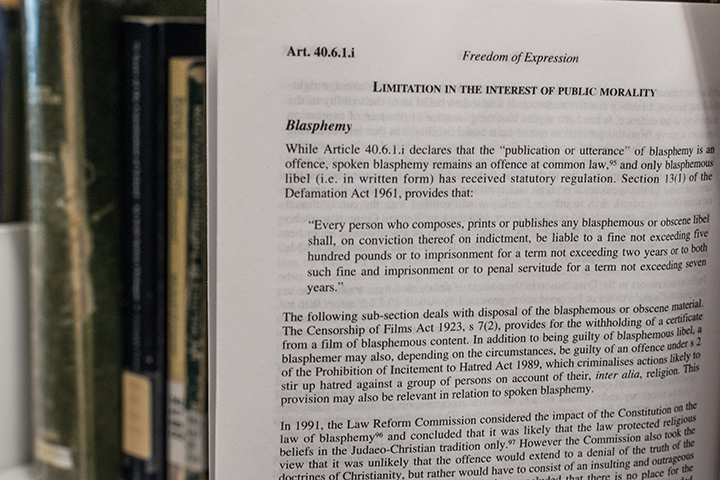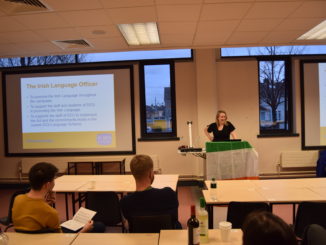
[dropcap]T[/dropcap]he blasphemy referendum is due to take place on October 26, the same Friday as the presidential election.
The law states that “the publication or utterance of blasphemous matter” is a punishable legal offence.
No polls have been released since the announcement of the referendum. However, in a poll from a Clair Byrne Live episode in May 2017, 62 per cent of Irish people said they would vote to remove the offence from the constitution.
Voting polls will open at seven in the morning and close at 10 in the evening. The referendum results are due to come out the next day, October 27, during the afternoon.
The law came from the common law system inherited from the British, but back then it only applied to Christianity. The last time anyone was prosecuted with that version of the law was in 1855.
The old version was ruled to be incompatible with the constitution in 1999, as it went against religious equality. The modern version of the law came into effect in 2009, and the maximum fine is €25,000.
The law targets anyone who does something that is “grossly abusive or insulting in relation to matters held sacred by any religion”. However, the law only applies if there is a substantial amount of outrage from the adherents of the applicable religion.
It was due to this reason that the most famous case in recent years was dropped. Back in 2017, comedian Stephen Fry was at the centre of a garda investigation due to blasphemous statements he made on RTÉ One.
Stephen Fry appeared on Gay Byrne’s TV show The Meaning of Life in February 2015. Byrne asked Fry what he would say to God if he met him at the gates of heaven.
Fry said: “How dare you create a world in which there is such misery? It’s not our fault? It’s not right. It’s utterly, utterly evil.
“Why should I respect a capricious, mean-minded, stupid god who creates a world which is so full of injustice and pain?”
The Gardaí investigated the situation after it was reported as a blasphemous offence. However, they were unable to find a sufficient amount of people outraged.
This is not the first time in recent history that the law caused controversy. Several Islamic groups in Ireland considered filing a complaint against the Charlie Hebdo magazine.
The magazine was published in Ireland shortly after the 2015 terrorist attack which occurred in the Charlie Hebdo offices in Paris. The front cover of the magazine was also reprinted in several Irish publications.
The front cover featured an illustration of the Muslim prophet Muhammad, which some Muslims consider offensive. Ireland’s Islamic Cultural Centre said that the picture was blasphemous.
However, as mentioned, a complaint was never officially filed, and therefore no investigation took place.
Professor Heiner Bielefeldt, the UN special rapporteur on freedom of religion, told The Guardian that while the law was unlikely to have any great effect in Ireland, it could be used to justify harsher laws in other countries.
“Those countries that continue to have an intimidating anti-blasphemy practice like to quote European countries to unmask western hypocrisy,” he said.
The secretary of the National Union of Journalists, Séamus Dooley, also argued against the law.
“I am convinced of the value of freedom of expression and… that means the right to offend.”
Last July, Ms Justice Isobel Kennedy was nominated as the chairwoman of the referendum committee.
The committee also includes the Comptroller and Auditor General Seamus McCarthy, the Ombudsman Peter Tyndall, the clerk of the Dáil Peter Finnegan and the clerk of the Seanad Martin Groves.
By: Brendan Fernando Kelly Palenque
Image credit: Daria Jonkisz



